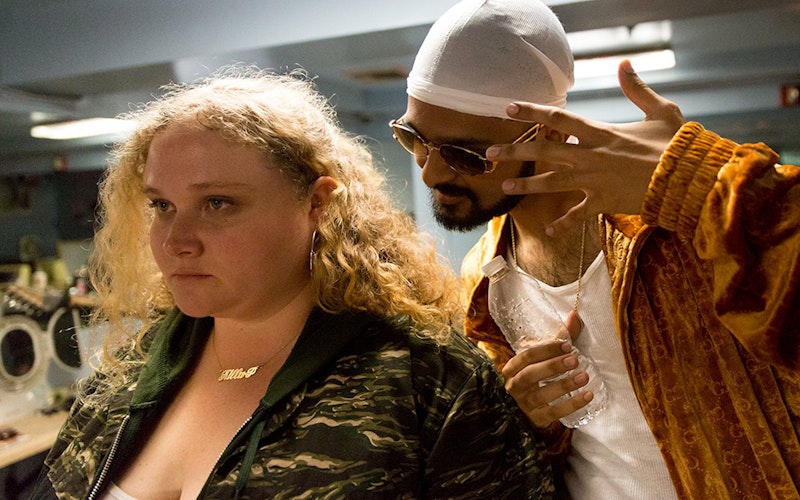
Movies
Patti Cake$ and Servanthood as a Marker of Success
A hip-hop movie featuring an effervescent, larger-than-life white girl is bound to groove to a few unorthodox beats. Patti Cake$ certainly fits the bill, setting a familiar underdog story to a decidedly original (and deservedly R-rated) soundtrack. The film rises above the worldliness of its subject matter, however, offering a moody reflection on the idols we pursue in the quest for personal greatness.
Danielle Macdonald delivers a breakout performance as Patricia “Dumbo” Dombrowski (a.k.a. “Killa P,” a.k.a. “Patti Cake$”), a 23-year-old Jersey girl aspiring to become the next big thing in rap music, despite not looking the part. When she isn't caring for her wheelchair-bound Nana (Cathy Moriarty) or working dead-end jobs to support her alcoholic mother (Bridget Everett), she improvises rap lyrics in parking lots with her best friend Jheri (Siddharth Dhananjay) and fantasizes about life as a hip-hop star. Others mock her ambitions, but Nana and Jheri encourage her to believe in herself and follow her dreams. Patti finally gets her coveted shot at center stage when she, Jheri, and Nana team up with a reclusive musician (Mamoudou Athie) to form the band PBNJ—a delightful team of misfits with an earworm of a demo track. But it turns out that Patti might not be ready for the limelight.
Patti Cake$ certainly won't win any awards for family-friendliness, but it does a fine job illustrating both the connection and tension between personal identity and commercial success. As hip-hop icon Jay-Z once said, “Belief in oneself and knowing who you are—I mean, that's the foundation for everything great.” In music, as in life, you don't get very far without some tough skin and an authentic personality.
At first, Patti seems to have both. Her confident swagger and heroic resilience in the face of multiple life challenges lend credence to the ritual of self-affirmation she performs in the bathroom mirror: “You're a boss b*$!@.” But as the film proceeds, we begin to sense that Patti is still working out what “boss” really means. Sometimes it seems to represent a quiet nobility that belies her brassy exterior, as when we see her sensitively tending to Nana’s incontinence or holding her intoxicated mother’s hair out of the way as she wretches in a public toilet. Other times, it suggests that a darker side of Patti’s character is vying for top billing in her life.
Patti is still working out what 'boss' really means.
In one of the film’s grittier scenes, for instance, a local rival provokes Patti into an extemporaneous parking lot rap battle. When she proves that she can spit with the best of them, their contest quickly devolves into a tit-for-tat exchange of hatefully obscene and sexually humiliating rhymes. In the end, the victory earns Patti no love—only a bloody nose. Worse, the whole incident feels out-of-sync with her character as we’ve seen it so far. We prefer the “boss” Patti who imperviously shrugs off the haters, not the one who responds to others’ abuse by skillfully dishing out her own.
Jesus once posed a convicting question to his followers: “What good will it be for someone to gain the whole world, yet forfeit their soul?” Worldly success isn’t evil in itself, but its single-minded pursuit can be deeply corrosive—particularly when it tempts us to accommodate ourselves to worldly expectations. Unless the attention we receive is consonant with our identity in Christ, it’s as worthless as any idol.
A big part of Patti’s problem is that her vision of success is rooted in her unhealthy obsession with a celebrity rapper named O-Z (Sahr Ngaujah). From the beginning, she dreams—in symbolic green hues—of finding favor in his eyes. She regards him as something of a messiah figure, hanging her hopes on his endorsement as her ticket out of her mundane, workaday existence. When she fortuitously gains an audience with him, some well-placed choral cues emphasize the religious fervor of the moment. But what Patti fails to realize is that the “gangsta” persona she has adopted in service of this false god fits her every bit as uncomfortably as the tuxedo shirt she’s obliged to wear for her desperately needed catering job. She can play the part, but it’s not who she really is. More importantly, in the eyes of those whose opinion ought to matter the most, she’s already a superstar.
Christians know, of course, that greatness doesn’t follow Jay-Z’s formula or that of any other commercially successful figure. It isn’t about who we are; it’s about whose we are. It’s about devoting ourselves to the true God, who redeems and elevates anyone willing to humble themselves, take up their cross, and pattern their lives after the image of his Son. Living out our identity in him is far more gratifying than any worldly acclaim—and it's worth more than anything we might give up to pursue it.
We see the potential for this greatness in Patti, but she isn’t there just yet. She still has to learn that the greatest people in life—and certainly in God’s kingdom—are usually the ones who receive the least applause.
Topics: Movies, Culture At Large, Arts & Leisure